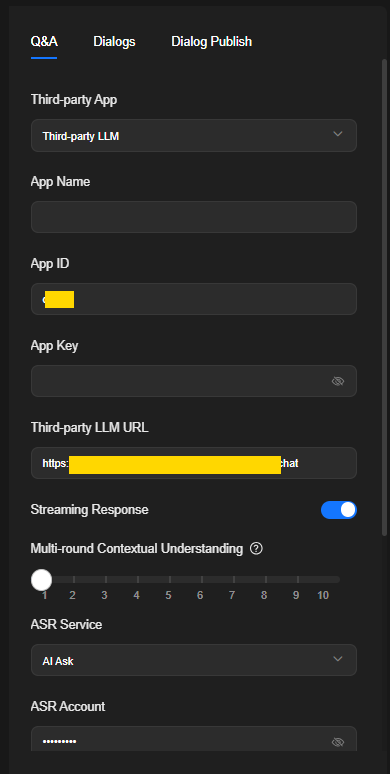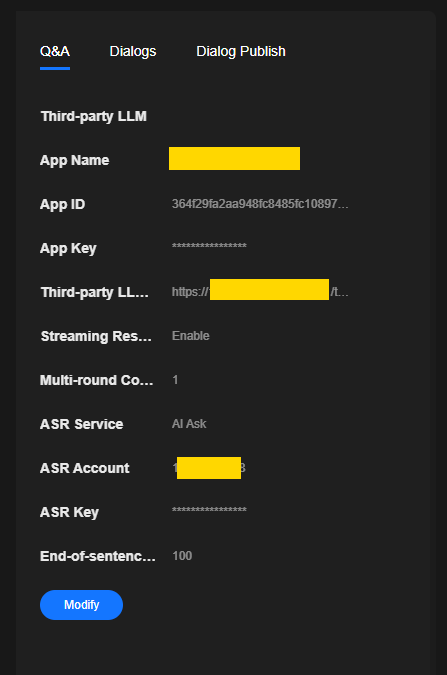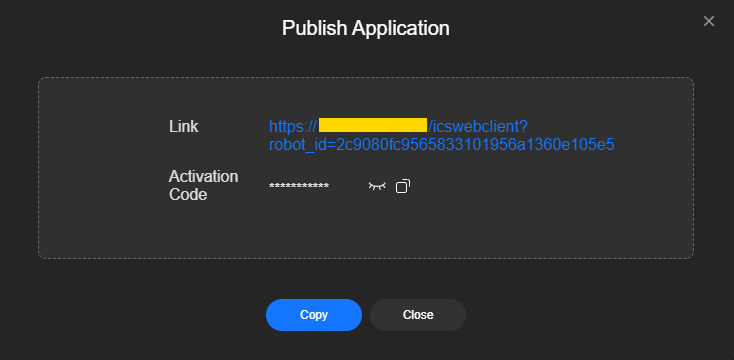Creating an Interactive Dialog Project
This section describes how to create an interactive dialog project on MetaStudio for users to engage with a virtual avatar. For details, see Intelligent Interaction Scenarios.
Procedure
- Log in to the MetaStudio console and go to the Overview page.
- Click Go to MetaStudio Console to go to the MetaStudio console.
- Click the Intelligent Interaction card. On the page of creating an interactive dialog project, set the role and background in sequence.
- Choose the Q&A tab on the right of the page, as shown in Figure 1.
Configure parameters by referring to Table 1.
Table 1 Q&A settings Parameter
Description
Third-party App
Select Third-party LLM.
App Name
Enter a custom application name.
App ID
App ID provided by the third-party LLM that interconnects with MetaStudio.
App Key
App key provided by the third-party LLM that interconnects with MetaStudio.
Third-party LLM URL
API address of the third-party LLM called by MetaStudio.
When MetaStudio interconnects with the third-party LLM, you need to develop the LLM API following the API parameter format defined by MetaStudio. For details, see Third-Party LLM Callback API for Intelligent Interaction. MetaStudio calls this API to implement intelligent interaction.
Streaming Response
MetaStudio intelligent interaction supports both streaming and non-streaming Q&A. You can enable streaming Q&A for faster response, but this feature may not be supported by all interconnected third-party LLMs.
Multi-round Contextual Understanding
A larger value indicates more historical dialogs in the Q&A request and better contextual understanding.
Specifically:
- If this parameter is set to 1, the Q&A request does not contain any historical dialogs.
- If this parameter is set to a value other than 1, the Q&A request contains historical dialogs. For example, if this parameter is set to 3, the Q&A request contains one latest question and two latest rounds of Q&A. The same logic applies to other values.
ASR Service
Select AI Ask from the drop-down list.
ASR Account
Enter the account for accessing AI Ask. For details, see Using AI Ask.
ASR Key
Enter the key for accessing AI Ask. For details, see Using AI Ask.
Check Configuration
Click Check Configuration to automatically check the configuration on the current tab. Any errors will be displayed in a message.
End-of-sentence Pause Duration
Voice activity detection (VAD) is performed on the cloud. If the pause at the end of a sentence exceeds the value of this parameter, speech recognition will end. A value greater than 500 ms is recommended.
Keyword
If the speech recognition result of some business-specific words is below expectations, you can use the keyword management feature. Adding these words to a keyword list will improve recognition accuracy and enhance user experience of virtual avatar interaction. You can configure a keyword list by referring to Creating a Keyword List.
- Click OK. The application has been created, as shown in Figure 2.
- (Optional) Choose the Dialogs tab to configure a dialog by referring to Dialogs.
- Choose the Dialog Publish tab and configure parameters by referring to Table 2.
Table 2 Publish settings Parameter
Description
Activation Code
An activation code is automatically generated after an intelligent interaction project is published.
Concurrency
Maximum number of users who use the generated activation code to access the intelligent interaction dialog project simultaneously. If the number of concurrent users exceeds the value of this parameter, the error code MSS.20010135 indicating insufficient dialog resources will appear on the intelligent interaction page.
Valid For
Available duration of intelligent interaction from the time of project publishing.
- Click Publish in the upper right corner of the page to publish the interactive dialog project.
The dialog box shown in Figure 3 appears. You can click the link to go to the page of activating intelligent interaction. Then copy and enter the activation code on the page to activate the project and interact with the virtual avatar.
You can also click Copy to copy and share the link and activation code with other users.

You can obtain the publish link and activation code of the dialog project by referring to Viewing an Interactive Dialog Project.
Feedback
Was this page helpful?
Provide feedbackThank you very much for your feedback. We will continue working to improve the documentation.See the reply and handling status in My Cloud VOC.
For any further questions, feel free to contact us through the chatbot.
Chatbot








